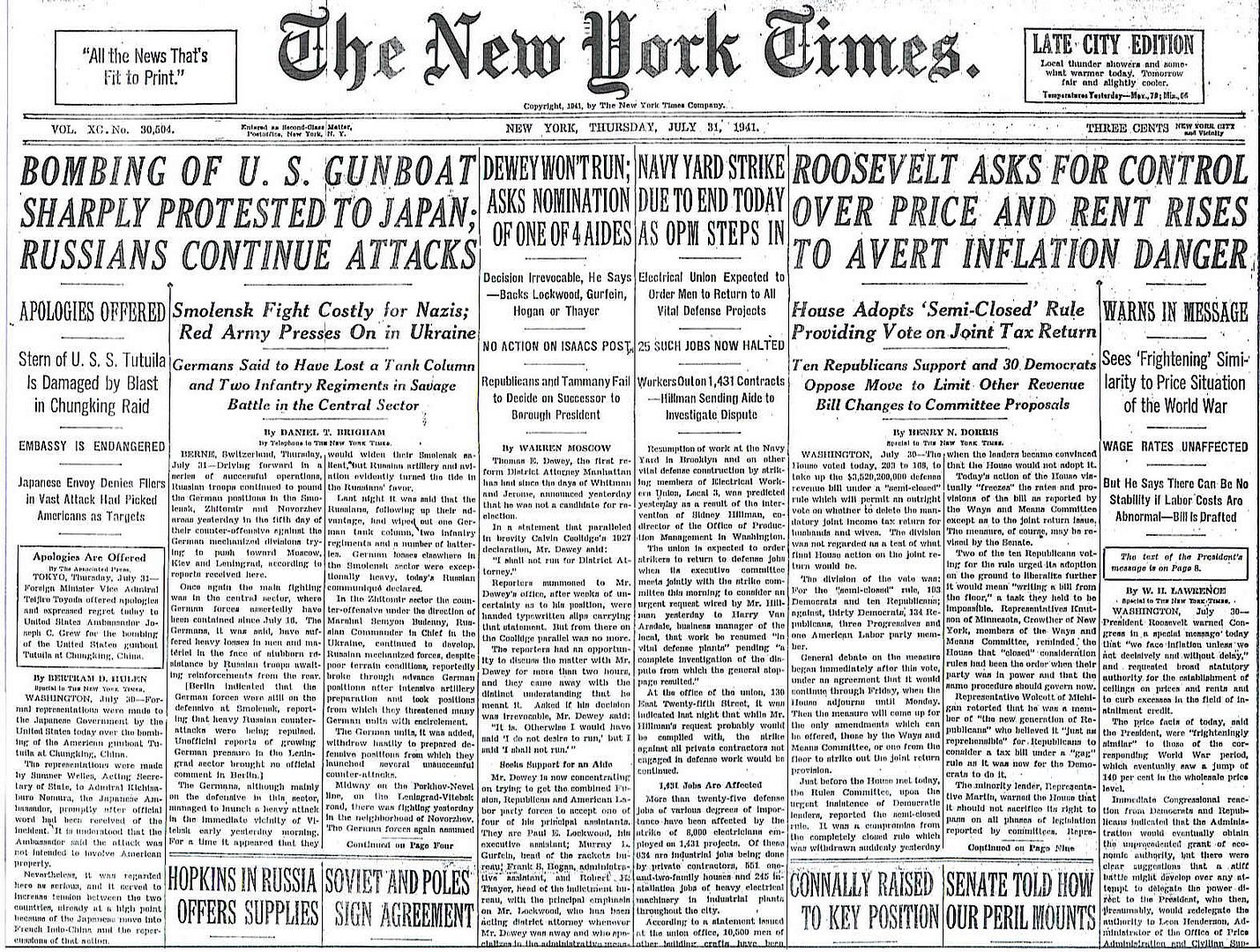
Posted on 07/31/2011 6:08:26 AM PDT by Homer_J_Simpson

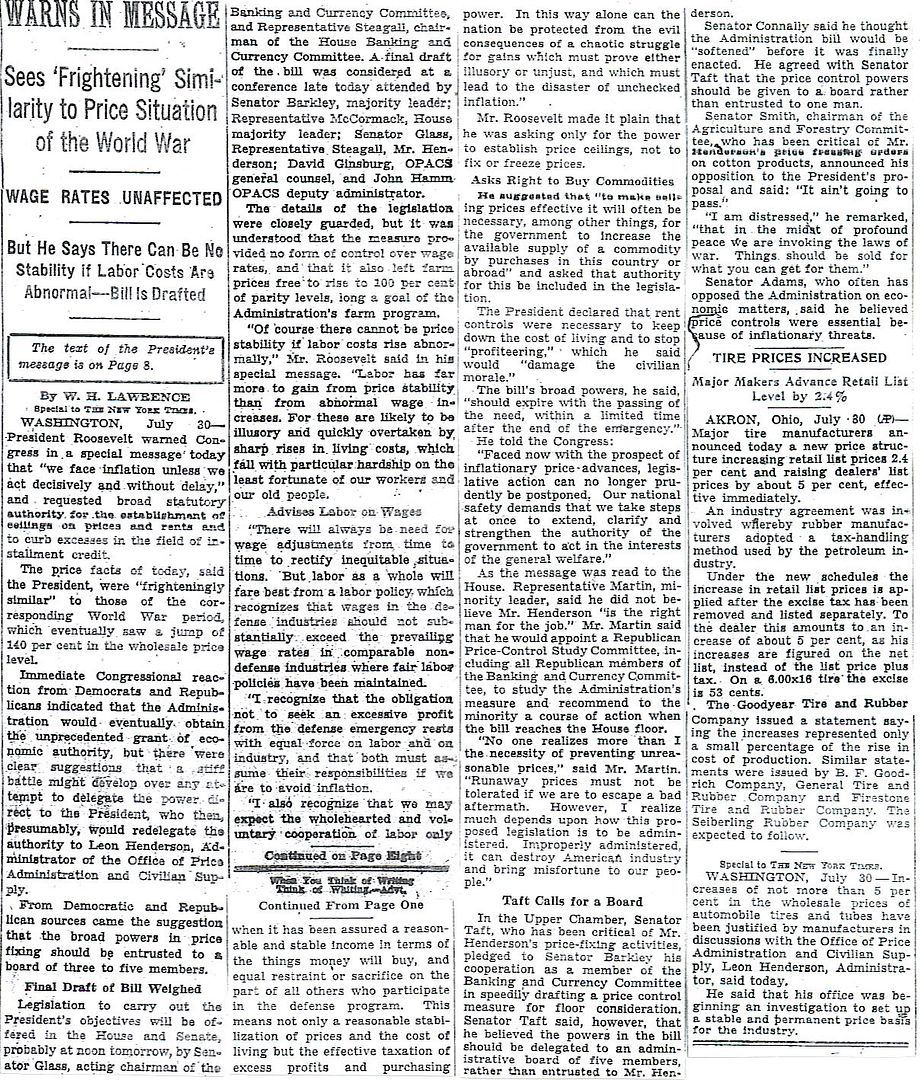
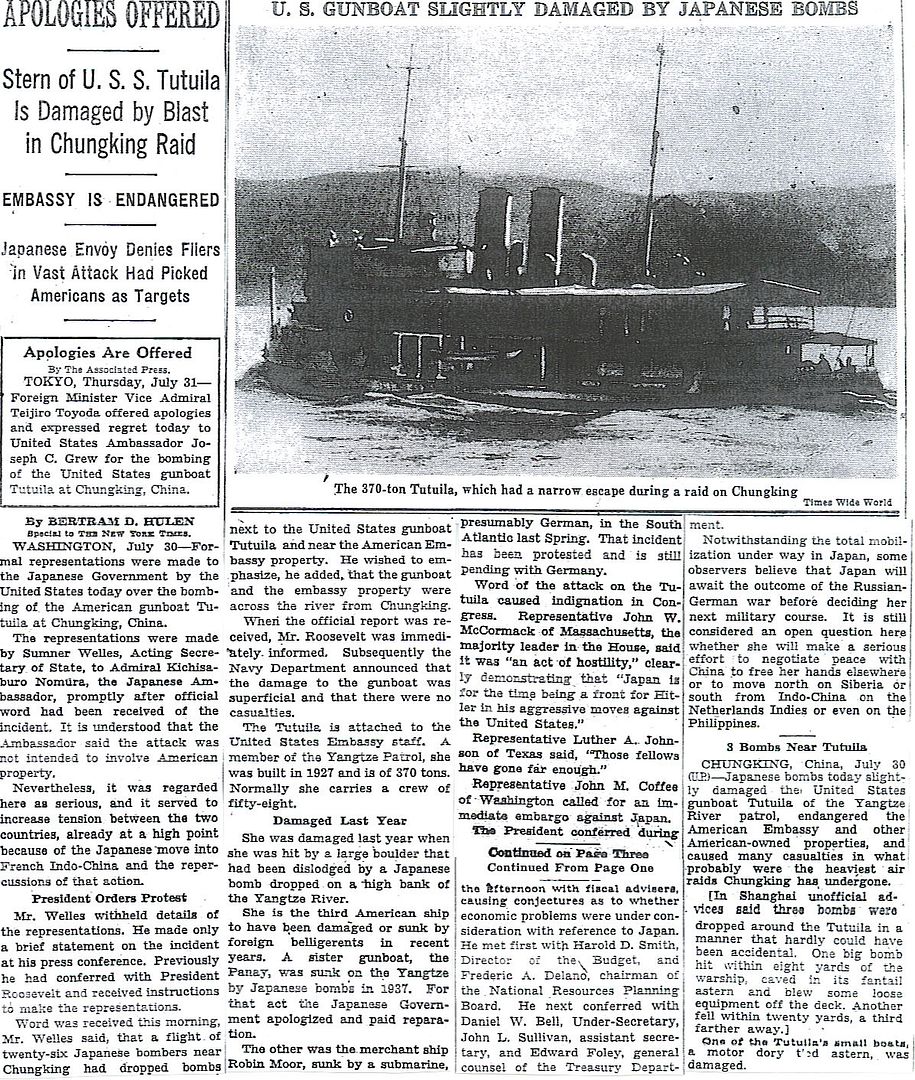
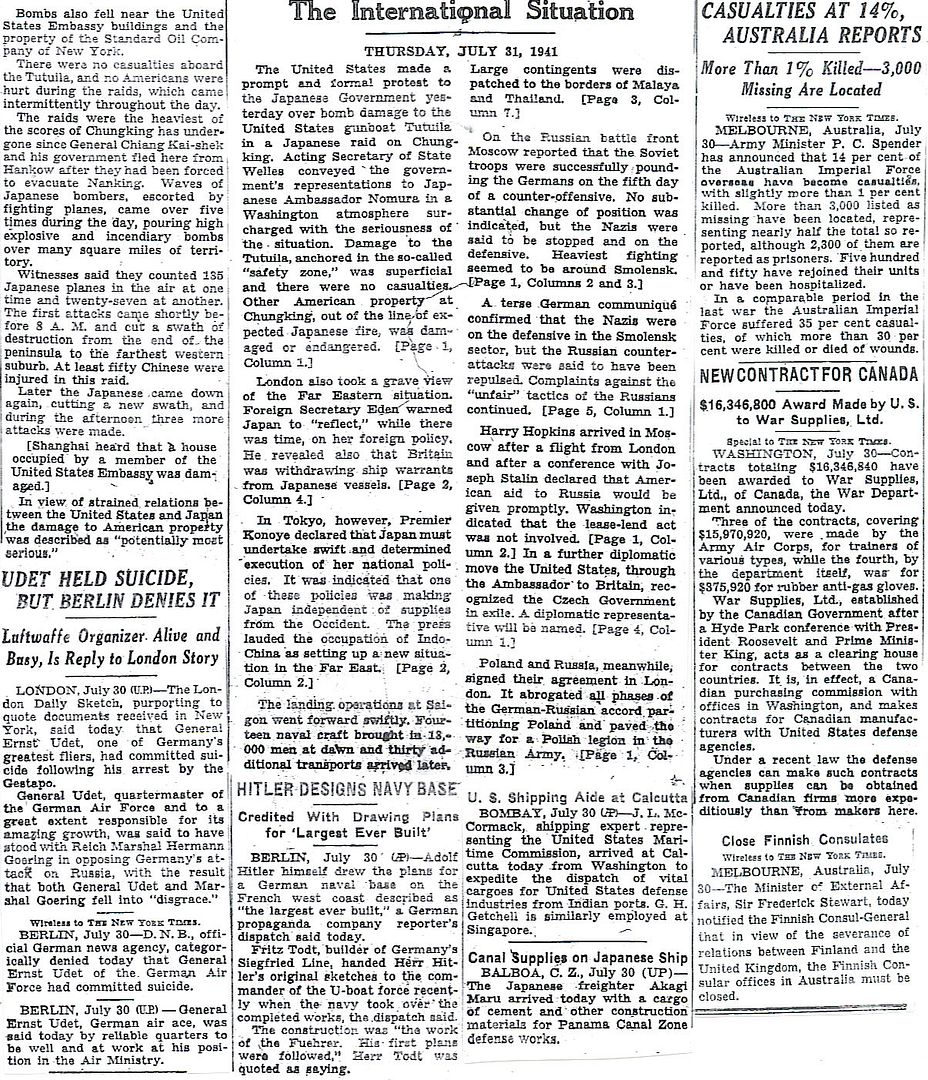
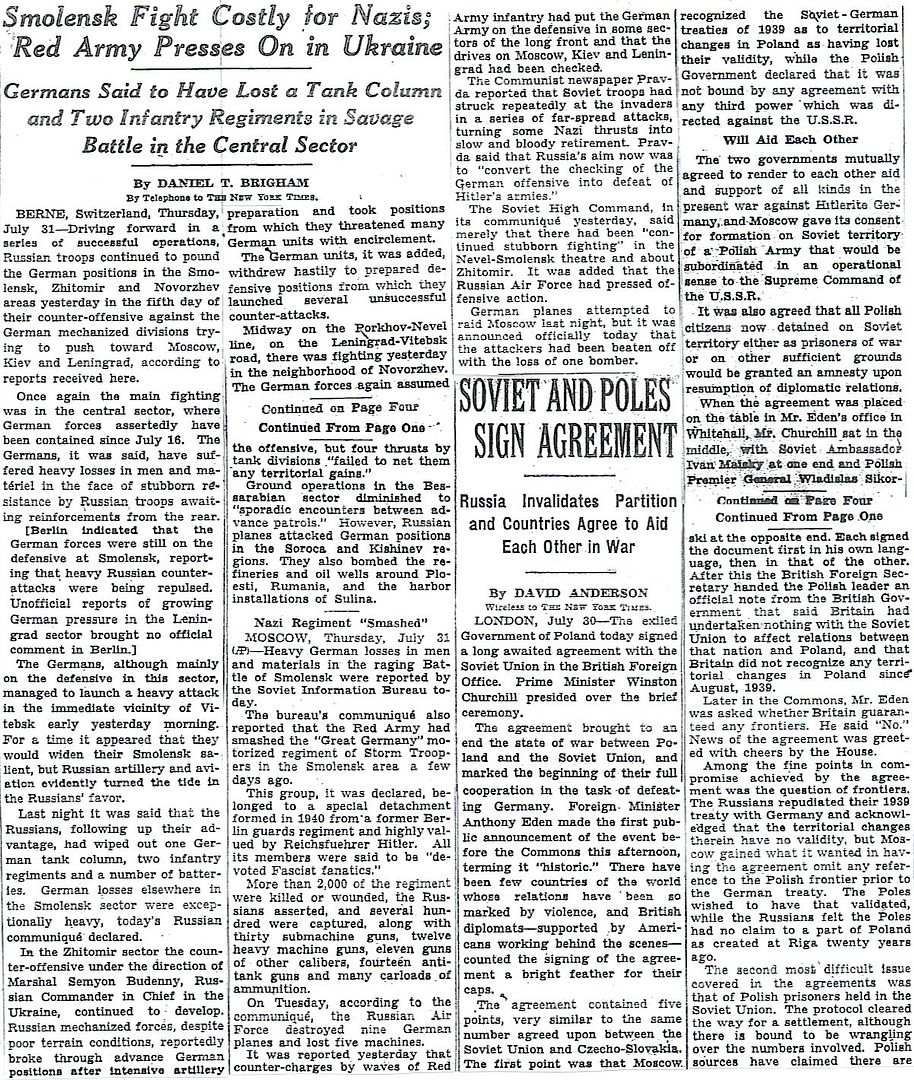
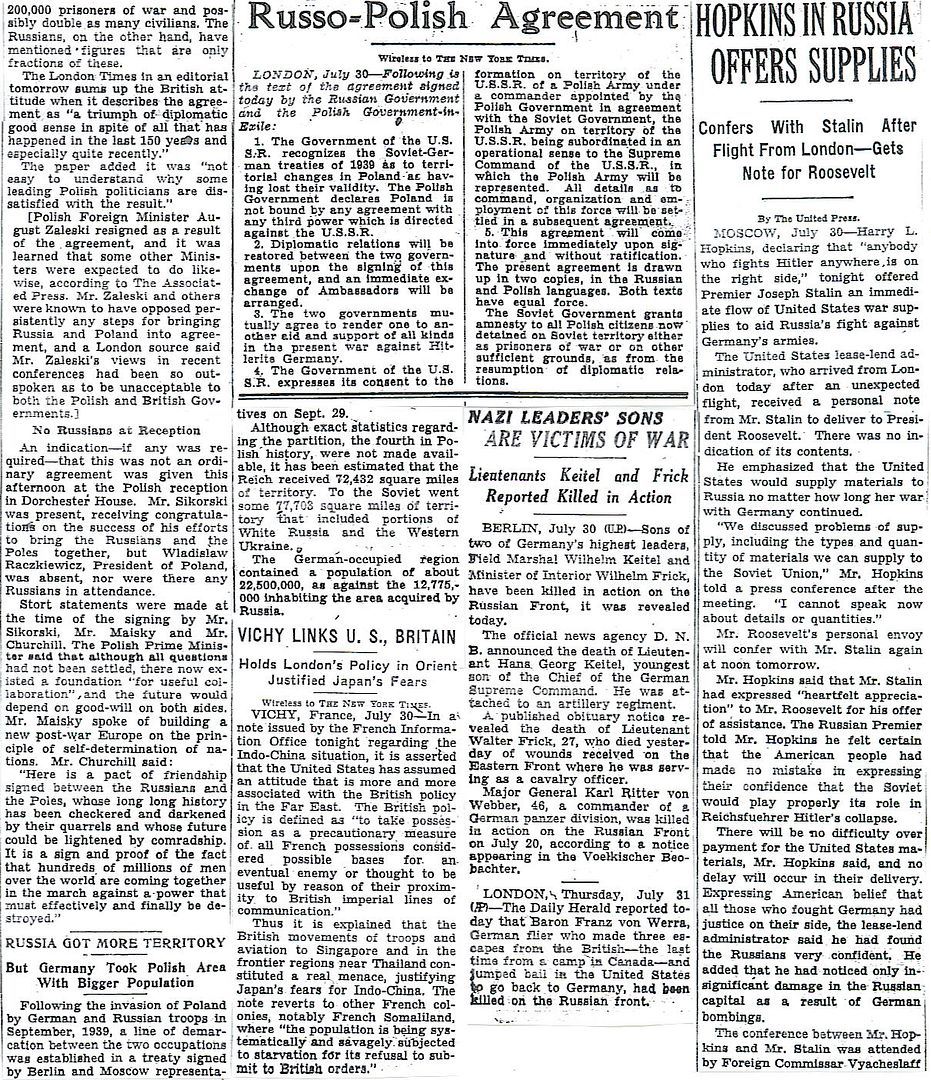
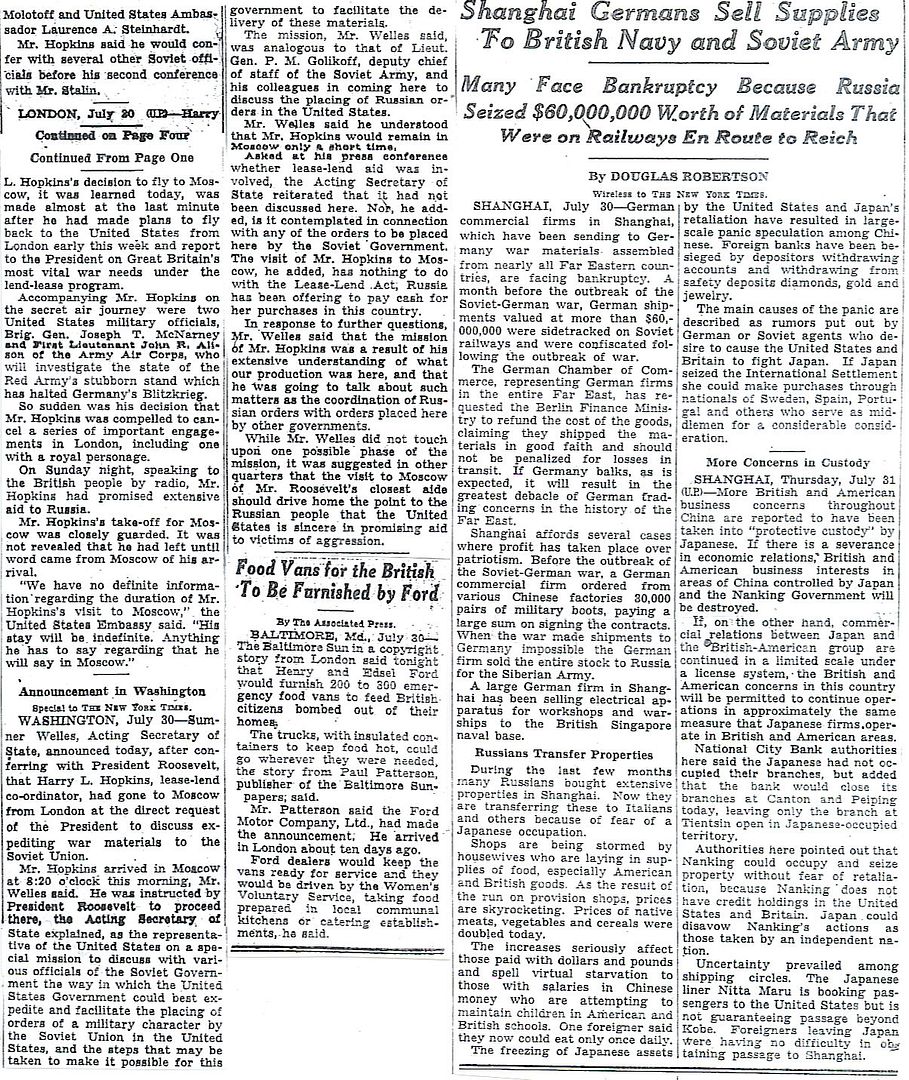
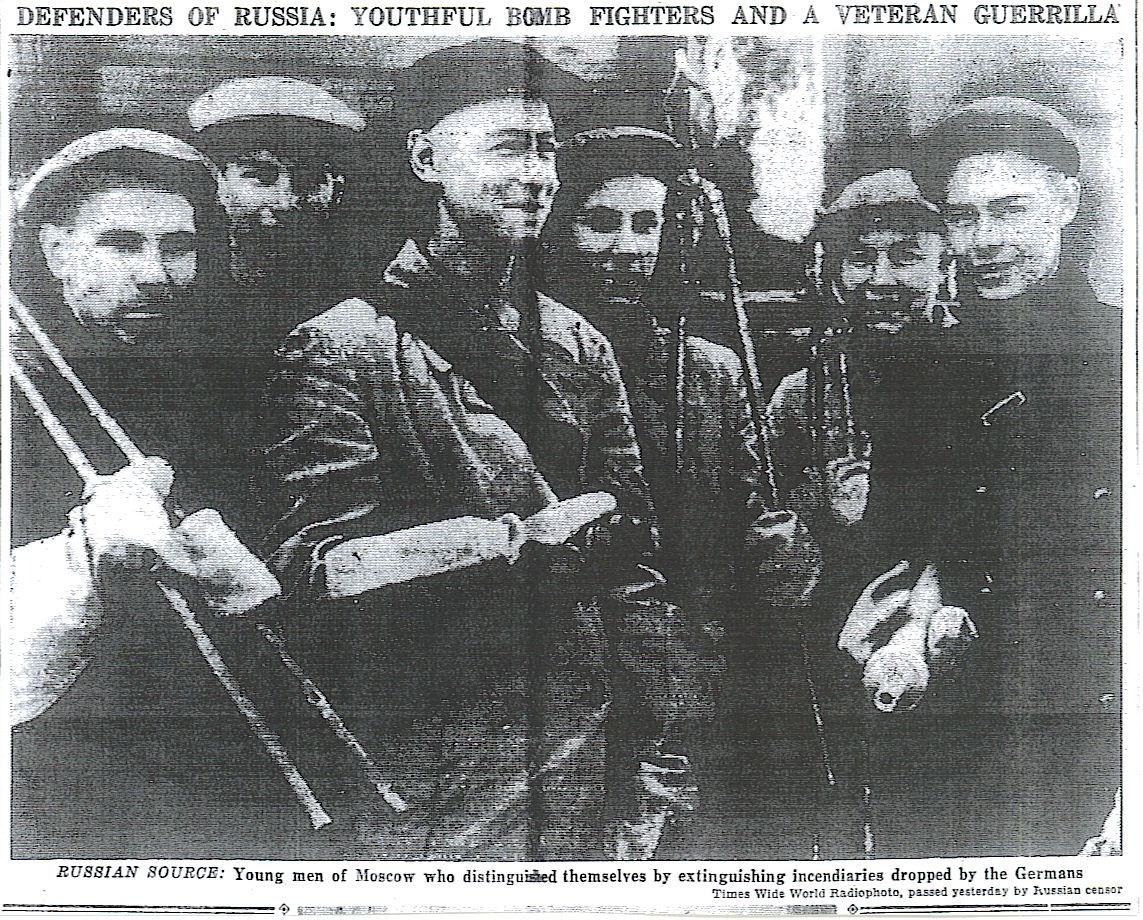
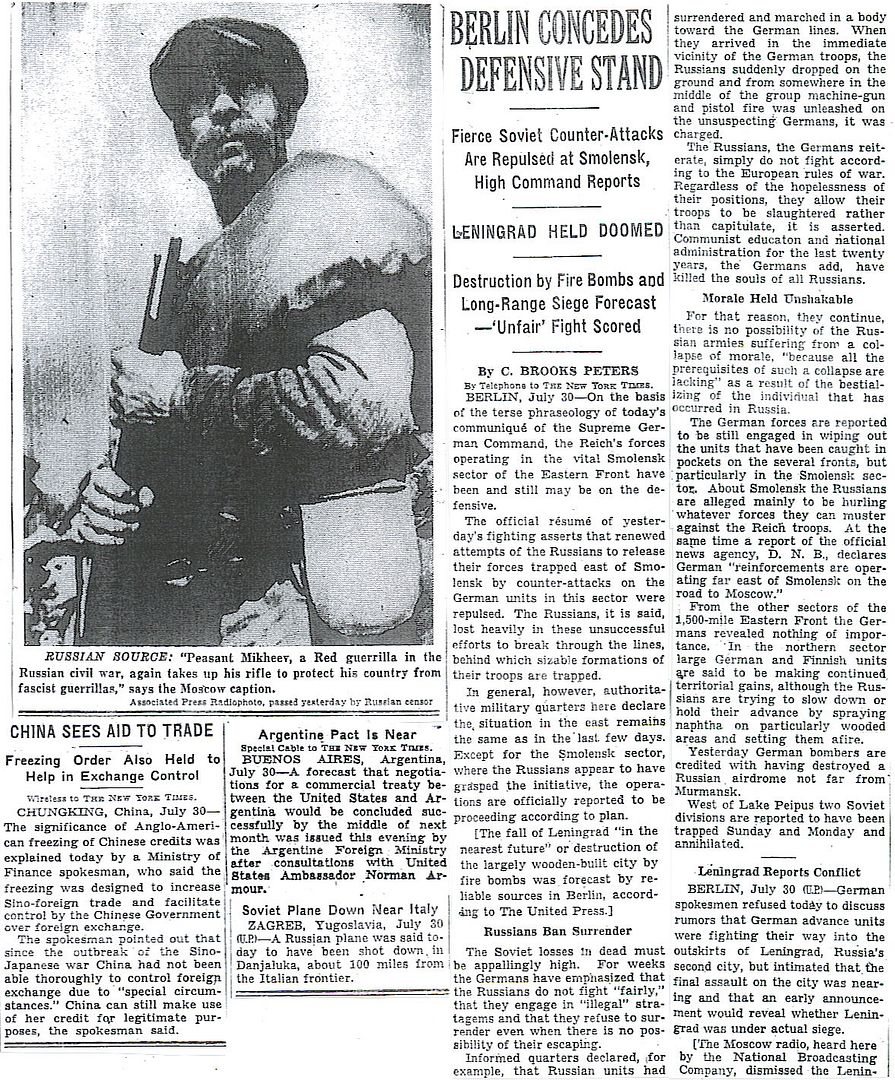
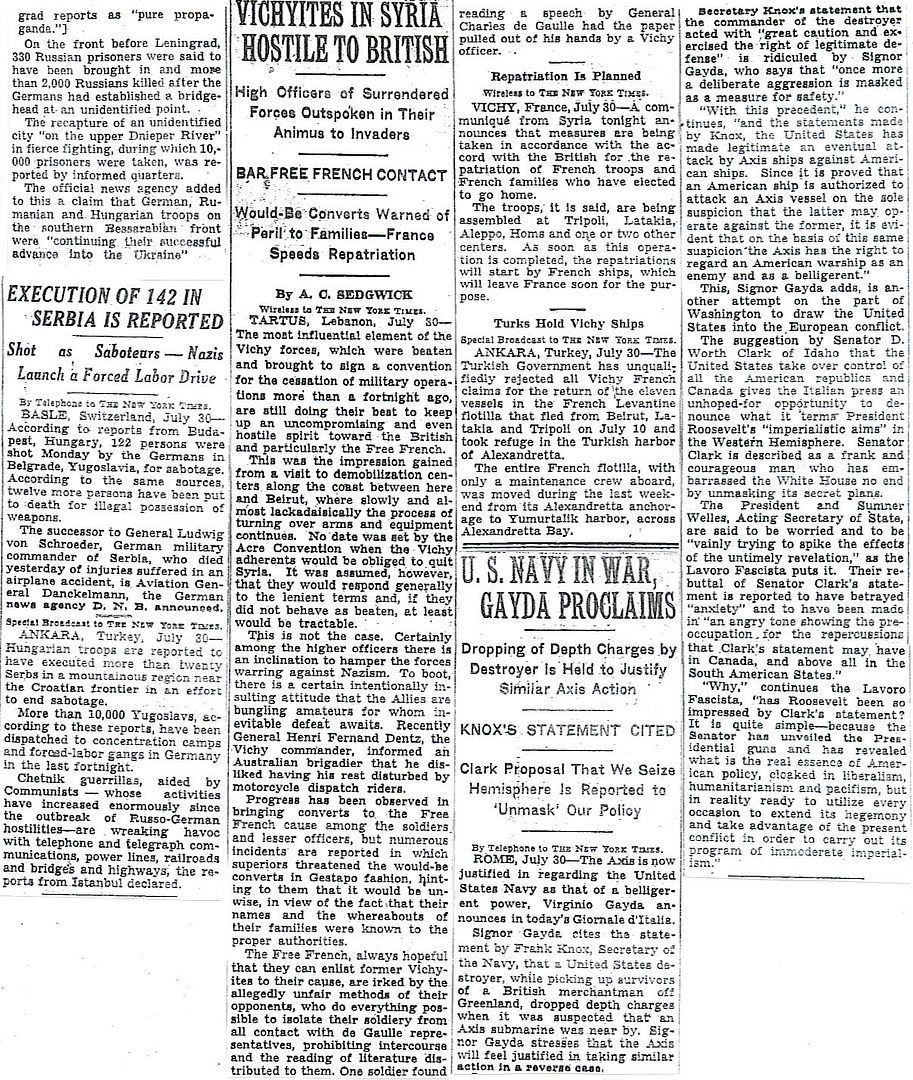
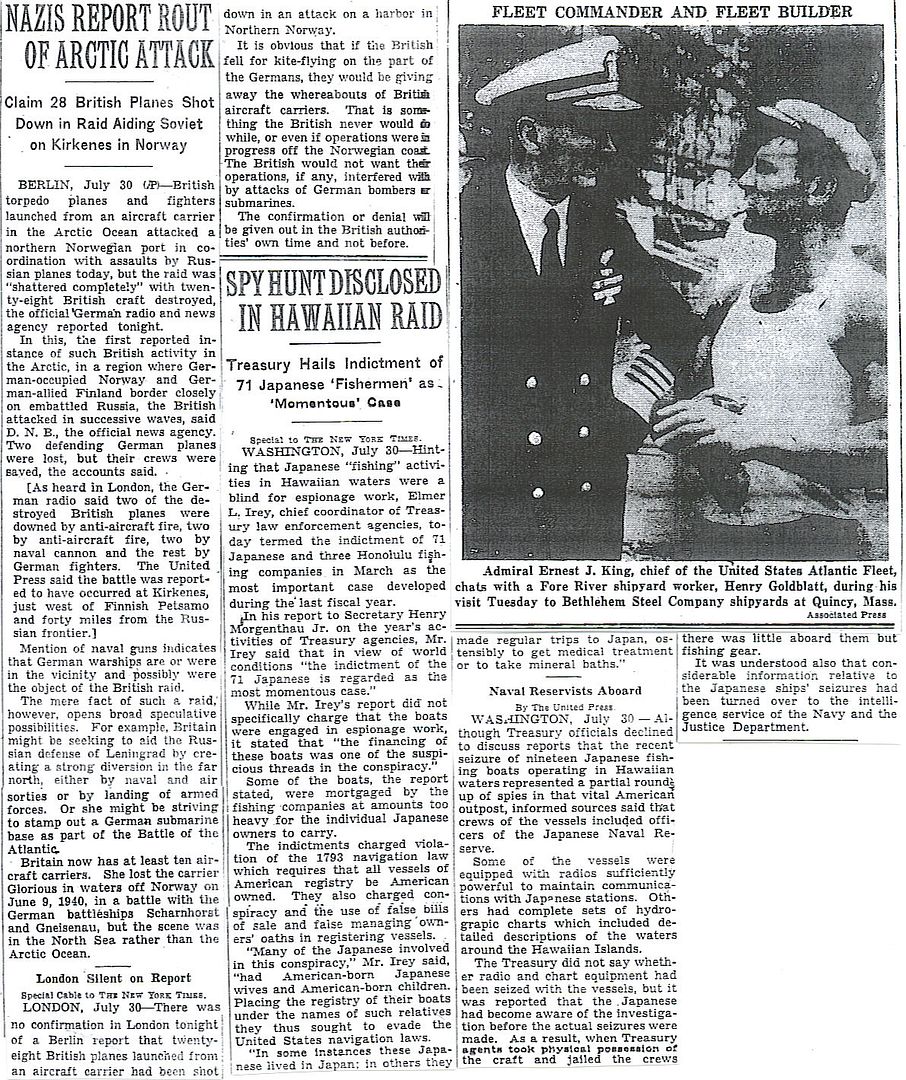
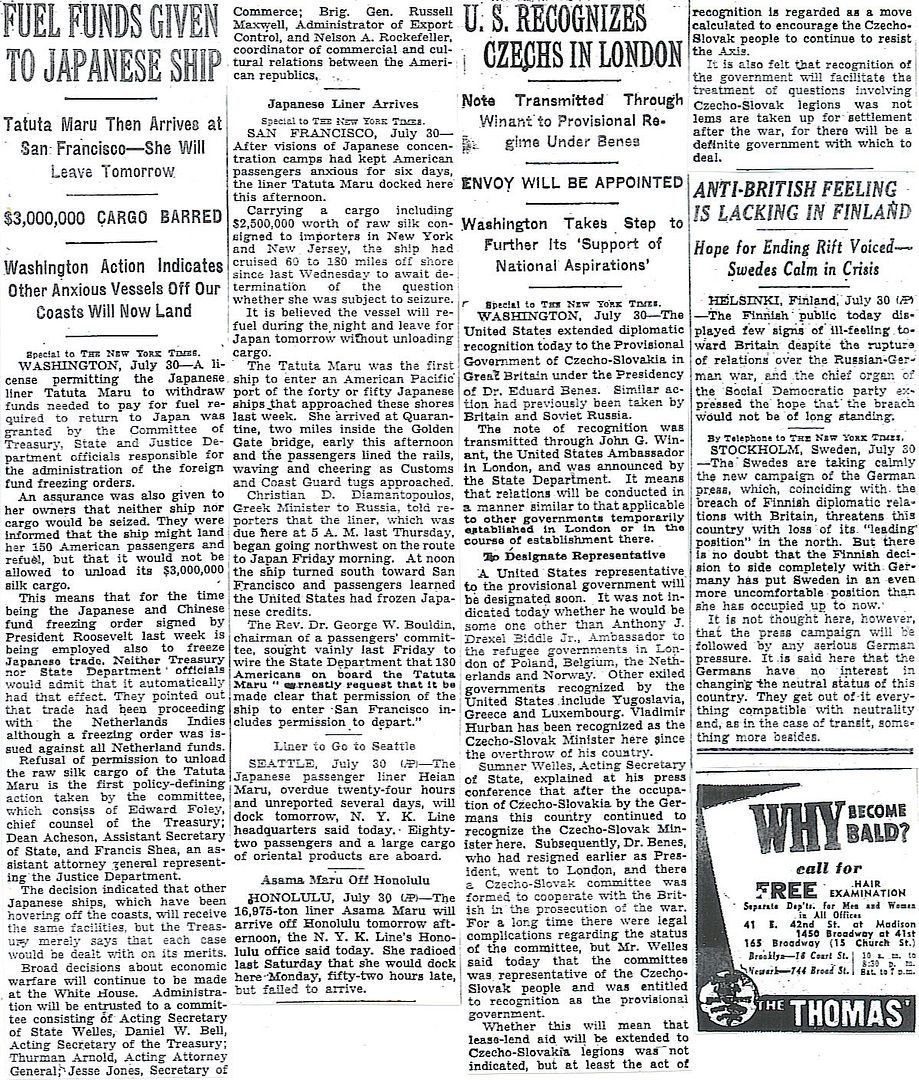
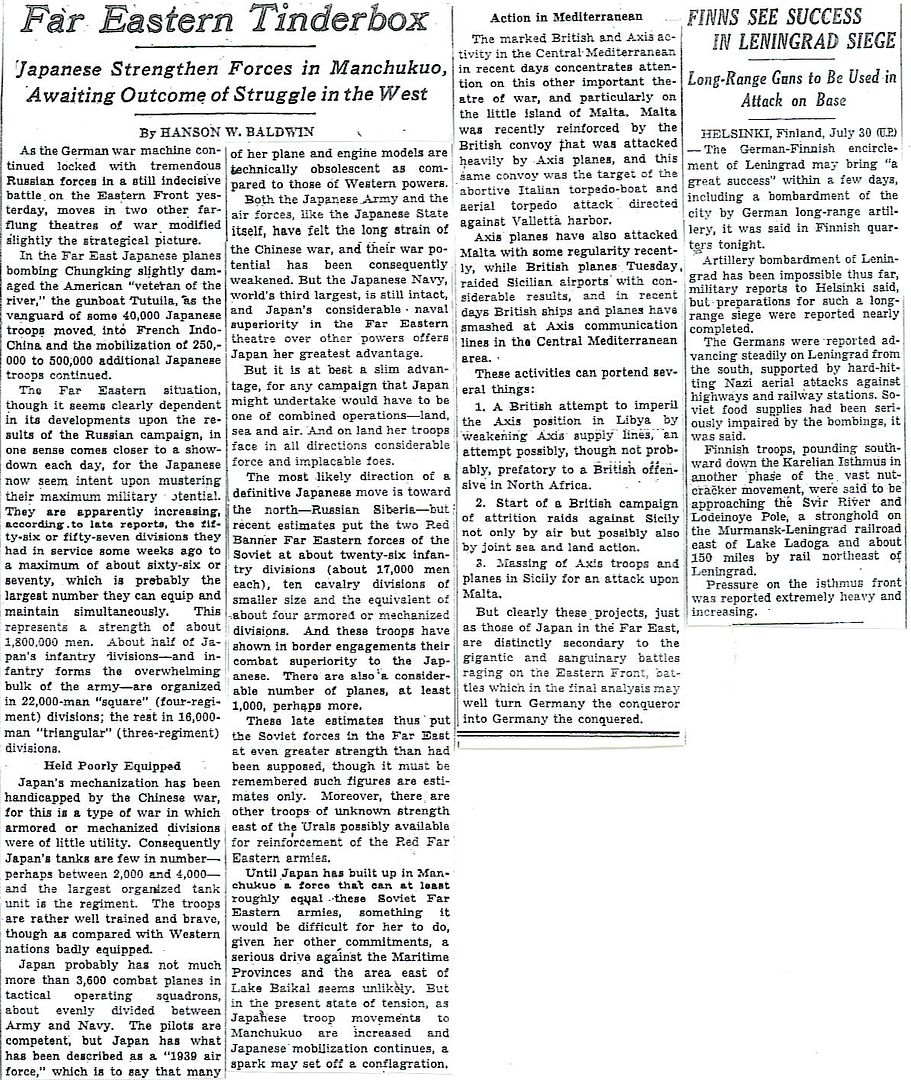
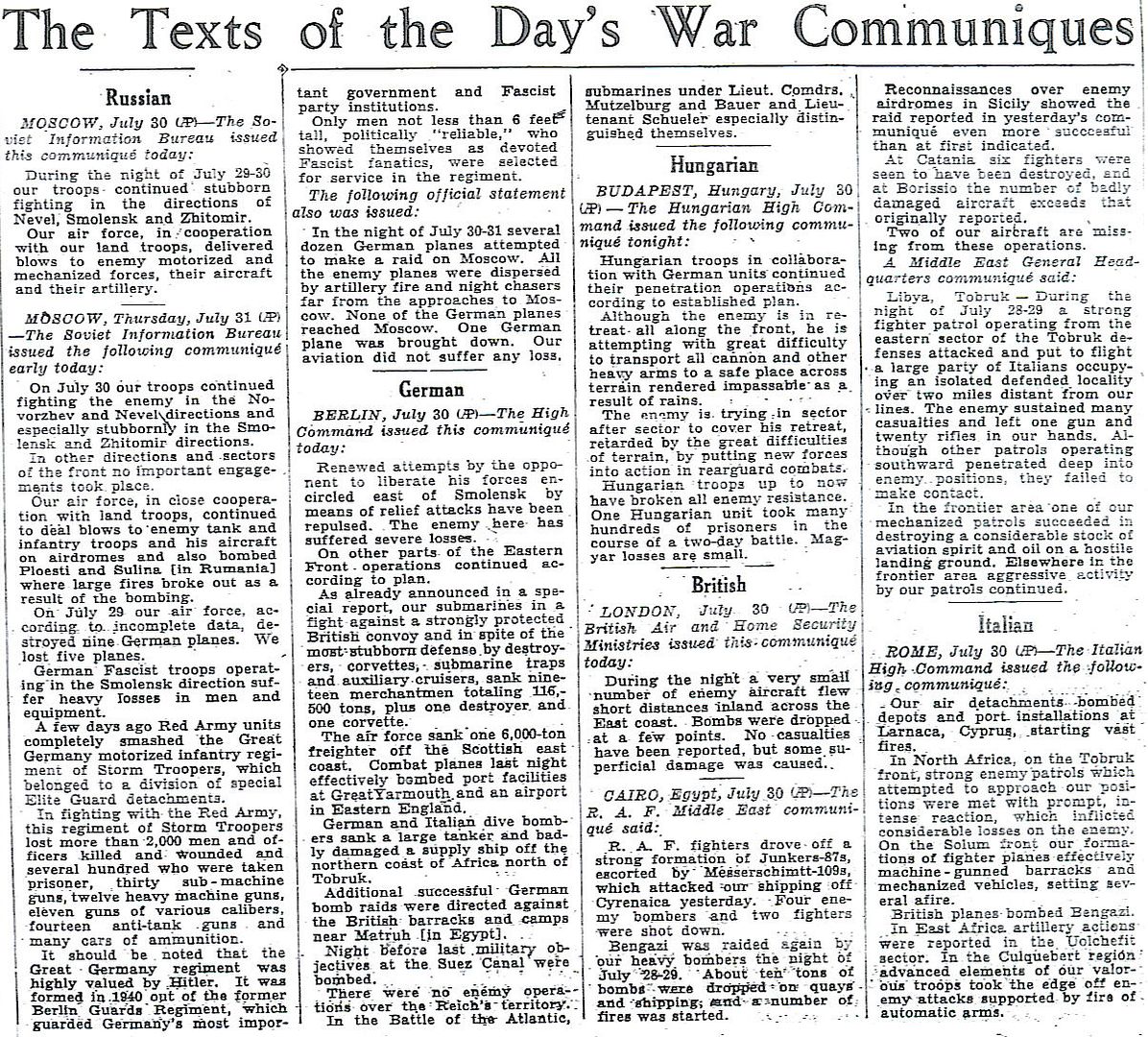
http://www.onwar.com/chrono/1941/jul41/f31jul41.htm
Nazis seeking “final solution” for Jews
Thursday, July 31, 1941 www.onwar.com
In Berlin... Goring orders Heydrich to make “all necessary preparations... for bringing about the complete solution of the Jewish question.”
On the Eastern Front... German 16th Army, part of the German Army Group North, continues the advance reaching the south side of Lake Ilmen. In southern Finland, Finnish attacks toward Viipuri and Vuosalmi begin.
In North Africa... The Axis forces are reorganized. General Cruewell now command the German Afrika Korps (DAK) with Rommel in charge of the new Panzer Group Africa. The 5th Light Division is renamed as 21st Panzer Division and Rommel, therefore, has two panzer divisions and one German infantry division in his force. In addition there are seven Italian divisions.
In the Mediterranean... There is a small British supply operation launched from Gibraltar to Malta.
In Washington... Roosevelt establishes the Economic Defense Board under Vice-President Wallace.
http://homepage.ntlworld.com/andrew.etherington/month/thismonth/31.htm
July 31st, 1941
UNITED KINGDOM: Civilian air raid casualties this month were 900 people killed and 908 injured.
Corvettes HMS Monkshood, Pentstemon commissioned.
Escort carrier HMS Pursuer laid down. (Dave Shirlaw)
GERMANY: Nazi plans to rid Europe of Jews took a step forward today, when Reinhardt Heydrich, the head of the RHSA (Reichssicherheitshaupamt [Reich Chief Security Office], which controls the police and Gestapo) received the following directive from Göring :
“I commission you to carry out all organizational, material and financial preparations for a total solution of the Jewish question in the German sphere of influence in Europe. If the competency of other organizations is affected by this, these organizations are to participate,
I further order you to submit to me as soon as possible a report showing the ... measures already taken for the execution of the final solution of the Jewish question.”
This order gives Heydrich full administrative power to set up a pan-European programme, operated by Himmler’s SS, to dispose of the Jews. The nature of the programme is still unfinalized, but some things are becoming clear.
First, the thoroughness of Einsatzkommando massacres in occupied Russia in the last six weeks suggests that murder on a massive scale, rather than emigration, has become the “solution” to the “problem”. Secondly, recent discussions between Himmler and Rudolf Hoess, the Aushwitz commandant, show that the order for that solution comes from Hitler himself.
It looks as though the Auschwitz camp and one to be built at Majdanek, near Lublin, are to become the main centres for the operation.
U-711 laid down.
U-581 commissioned.
U-172 launched. (Dave Shirlaw)
FINLAND: II Corps (Maj. Gen. Laatikainen) begins its attack on Karelian Isthmus. The Corps consists of 2nd, 15th and 18th Divisions (with the 10th Div. waiting in Supreme HQ’s reserve). The ultimate goal of the attack is to recapture Viipuri (Vyborg), the second largest city of Finland before 1939, lost to Soviet Union after the Winter War. The defending forces are Soviet 142nd and 115th Divs in well-prepared positions. The attack meets heavy resistance and the intense fighting slows Finnish advance in the first days of the attack. (Mikko Härmeinen)
U.S.S.R.: At the end of 14 days of continuous slaughter, Einsatzkommando groups have killed 10,000 Jews at Kishinev and 2,500 at Zhitomir. Immediately a region is occupied by German troops the Einsatzgruppen move in, gather together the local Jews, strip them of clothing and valuables and shoot them dead in a remote part of the countryside. The corpses are thrown into a shallow ditch.
Local people especially in the Ukraine and Lithuania, join in mounting their own pogroms.
The German army reaches Lake Ilmen and the Finnish army starts an attack aimed at Viipuri.
Moscow:
Tallinn, the Estonian capital, has been surrounded by von Leeb’s Army Group North as he strikes for Leningrad. “Fast Heinz” Guderian’s tanks are approaching Moscow, Kiev is threatened by von Kleist and the Black Sea, the Romanian 4th Army is advancing on Odessa. The triumphal progress of the Wehrmacht is shown by the scale of Russian casualties - over a million in little more than a month of fighting, although the German casualties have been heavy too, over 100,000, more than in all its previous campaigns. Weaknesses are beginning to show in the German war machine. Some tanks are breaking down because their air filters cannot cope with the dust of the Russian steppes, and supply lines are stretched to breaking point. General Hopner, leading the Panzer thrust to Leningrad has been forced to delay his attempt to seize the city because he is short of shells. The scorched-earth policy is also denying the invaders the opportunity to live off the conquered lands.
The Russian Army fired the first volley of Katyusha Rockets. (Bill Howard)
MEDITERRANEAN SEA: Force H covers a small convoy to Malta. Destroyers and aircraft from HMS Ark Royal attack Alghero in Sardinia.
NORTH AFRICA: Axis forces are reorganised; General Ludwig Cruwell takes over command of the Afrika Korps while Rommel commands the new Panzerarmee Afrika.
CHINA: The Japanese government advises the US government that the bombing of the river gunboat USS Tutuila (PR-4) at Chungking, China yesterday was, “an accident, ‘pure and simple.’” (Jack McKillop)
CANADA: Corvette HMCS Battleford commissioned. (Dave Shirlaw)
U.S.A.: Burbank, California: The first Lockheed Ventura makes it’s maiden flight. It is the first of 675 placed by the British Purchasing Commission and is designed to replace the Hudson.
The U.S. Army establishes the Military Police Corps. (Jack McKillop)
Washington: Roosevelt explains the introduction of price controls to Congress, on the basis of controlling inflation and reducing the rise in domestic consumption.
Washington:
US Army Chief of Staff George Marshall issues public statement that it was now US policy to defend the Philippines and that Philippine defence was to take the “highest priority”. (Marc Small)
The US Asiatic Fleet and US Army Harbor defence Command close Manila harbor by mining. Henceforth, civilian shipping requires escort through the minefields by Asiatic Fleet vessels or by US Army Mine Planters assigned to the Harbor defence Command. (Marc Small)
Senator Knox has explained what happened when a US destroyer dropped depth bombs off the coast of GREENLAND:
One US destroyer operating off Greenland heard the SOS of a steamer and proceeded to the location and picked up 60 of the survivors of the steamer. ...the operator of the listening equipment reported that he though he heard a submerged submarine.
The captain immediately turned toward the direction indicated and dropped three depth charges. In doing this he very rightly exercised the right of self-preservation.
There was no evidence that a submarine was there... the echo might have been received from a whale or large fish, or a cold current..
The motion picture “Hold Back the Dawn” is released in the U.S. The film is directed by Mitchell Leisen and stars Charles Boyer, Olivia de Havilland, Paulette Goddard, Walter Abel and Rosemary DeCamp; Brian Donlevy and Veronica Lake appear in uncredited bit parts. This tear-jerker has Boyer as a Rumanian gigolo being rejected as he tries to enter the U.S. so he marries a spinsterish American (de Havilland). After entering the country, he plans to dump her and marry his girlfriend (Goddard) who got into the U.S. the same way. The film is nominated for six Academy Awards including Best Picture and Best Actress (de Havilland). (Jack McKillop)
Destroyers USS Duncan, Lansdowne, Pringle laid down. (Dave Shirlaw)
NORTH ATLANTIC OCEAN: Royal Navy hopes are high as this month ends that they are over the worst in their battle with the U-boats. Losses to Allied shipping are now running at under one-fifth of the peak rate of 688,000 tons suffered in April.
There has been a steady improvement, thanks to more escorts and better support at the Iceland base, with the US now helping out as well as Canada. And the Germans have had less air support since the Russian front opened.
BATTLE OF THE ATLANTIC:
Losses:
23 ships of 98,000 tons.
Losses in home waters:
18 ships of 15,000 tons.
Bayerlein had understood Guderian very well. During the day the first directives had come down from Army Group Centre revealing the new plan: parts of Second Panzer Group were to drive south into the Ukraine. Immediately after Guderian's telephone call Colonel Freiherr von Liebenstein, chief of staff of Second Panzer Group, summoned the staff officers. He knew Guderian. When he came back from Rastenburg he would expect the new plan to be ready in outline.
There was no one at headquarters who was not deeply depressed by Hitler's decision to turn against the Ukraine instead of against Moscow. Nobody understood it. Every one regarded it as a mistake. The staff officers' trained minds rebelled against the fundamental violation of one of the basic strategic rules in the spirit of Clausewitz—not to be seduced away from one's main objective, always to stick to the basic framework of one's operational plan, and to concentrate all one's forces against the enemy's strong point.
This turning away from Moscow at the very moment when it seemed within reach, barely two hundred miles away and, as far as anyone could predict, almost certain to fall to Guderian's and Hoth's now refreshed armored forces, was very soon to be seen as a serious error of judgment.
The directives for the new operation were clear. As far as Guderian's two Panzer Corps were concerned, they read:
Drive to the south into the rear of the Soviet Fifth Army, the core of Marshal Budennyy's Army Group South-west Sector, defending the Ukraine beyond the Dnieper to both sides of Kiev
Guderian's first target was the big railway junction of Konotop on the Kiev-Moscow line. The next step would depend on the situation, according to the progress made by Army Group South.
When, on 24th August, Guderian arrived at Shumyachiy, a small village on the Moscow highway where Liebenstein had set up the headquarters of the Panzer Group, he was again full of zest. He greeted Liebenstein, Bayerlein, and Major von Heuduck, his Intelligence officer, who were all patently disappointed, and went with them straight to his headquarters bus.
" I know what you're thinking," he said calmly.
" Why didn't he succeed-why did he give in?"
He did not wait for an answer.
" There was nothing I could do, gentlemen," he continued. "I had to give in. I was out there alone. Neither Field-Marshal von Brauchitsch, the Commander-in-Chief, nor the Chief of the General Staff had accompanied me to the Fuehrer. I was faced by a solid front of the High Command of the Wehrmacht. All those present nodded at every sentence the Fuehrer said, and I had no support for my views. Clearly the Fuehrer had expounded his arguments for his strange decision to them before. I spoke with a silver tongue -but it was in vain. Now we can't go into mourning over our plans. We must tackle our new task with all possible vigour. Our hard-won jumping-off positions for Moscow-at Roslavl, Krichev, and Gomel-will serve us now as a springboard into the Ukraine ."
Guderian was right. The operations conducted by his Army Group around Roslavl and Krichev at the beginning of August, resulting in about 54,000 Russian prisoners, now proved a valuable prerequisite also for the new operation. Let us look back at the three weeks which have passed.
On 1st August Guderian had started operations against Roslavl. His plan was a typical battle of encirclement. He operated with two Infantry Corps and one Panzer Corps. The bulk of the infantry divisions attacked the enemy frontally in order to tie him down. The 292nd Infantry Division, acting as IX Corps' striking division, strongly supported by artillery and rocket mortars, pushed to the south in the Russian rear. From the south-western wing 3rd and 4th Panzer Divisions performed a rapid outflanking movement, first to the east, then north across the Roslavl-Moscow road, and closed the ring with 292nd Infantry Division on the Moscow highway. The plan worked. Roslavl became a genuine, if minor, battle of encirclement.
The war diary of Captain Küppers, artillery liaison-officer of 197th Infantry Division, the combat report of VII Army Corps, and the day-to-day reports of engagements of an infantry battalion—all of them extant—provide an impressive picture of the fighting.
H-hour was 0430. Along the entire line of VII Corps the attack was launched without artillery preparation. The spearheads of the infantry regiments worked their way forward— past the communications group of the artillery commander, who had been lying in the front line with Lieutenant-Colonel Marcard since 0300 hours, watching the Russian positions. Everything was quiet on the Russian side. Suddenly the quiet of the morning was broken by the first rifle-shots from the infantrymen who had just moved forward. Triggers were pulled too soon by nervous fingers. They roused the Russian night sentries. At once Soviet machine-guns opened up. Mortars plopped. Major-General Meyer-Rabingen, the commander of 197th Infantry Division, drove in his jeep to the foremost line. Farther down, in the village of Shashki, Major Weichhardt's 3rd Battalion, 332nd Infantry Regiment, had already broken into the Russian positions. It was a case of bayonets, spades, and pistols.
Thirty minutes later the white Very lights went up: " We are here!"
" Artillery forward," the advanced observer radioed back.
A moment later Captain Bried was on the move. He commanded the 2nd Battalion, 229th Artillery Regiment. His car got as far as the edge of the village. Then there was a flash and a crash—a minefield.
The nearside front wheel of Bried's car sailed through the air. The observer's car, which followed behind, suffered the same fate as it tried to swing off the road. In response to the signal " Sappers forward!" Engineers Battalion 229 cleared the mines.
Meanwhile the guns of the 2nd Battalion had moved into position and were supporting the infantry with their fire. The first few prisoners were brought in for interrogation. A short Ukrainian was found to speak German. He looked trustworthy. An interpreter unit supplied him with a denim uniform and a white armlet lettered " German Wehrmacht
On 2nd August at 0400 hours the infantry went into action again.
Their objective was the main road from Smolensk to Roslavl. It was a particularly hard day for 347th Infantry Regiment. Its battalions were stuck in difficult terrain in front of a thick and swampy patch of woodland and were only able to advance inch by inch and at the cost of heavy losses. The Russians again proved their mastery in forest fighting. With sure instinct they moved among the impenetrable undergrowth.
Their positions, not on the forest's edge but deep inside, were superbly camouflaged. Their dugouts and foxholes were established with diabolical cunning, providing for a field of fire only to the rear. From in front and from above they were invisible. The German infantrymen passed them unsuspecting, and were picked off from behind. The Russians were also very good at infiltrating into enemy positions. Moving singly, they communicated with each other in the dense forest by imitating the cries of animals, and after trickling through the German positions they rallied again and re-formed as assault units. The headquarters staff of 347th Infantry Regiment fell victim to these Russian tactics.
In the night, at 0200, the shout went up, " Action stations!" There was small-arms fire. The Russians were outside the regimental headquarters. They had surrounded it. With fixed bayonets they broke into the officers' quarters. The regimental adjutant, the orderly officer, and the regimental medical officer were cut down in the doorway of their forest ranger's hut. NCOs and headquarters personnel were killed before they could reach for their pistols or carbines. Lieutenant-Colonel Brehrner, the regimental commander, succeeded in barricading himself behind a woodpile and defending himself throughout two hours with his sub-machine-gun.
An artillery unit eventually rescued him.
Meanwhile, 332nd Infantry Regiment had reached the main road from Roslavl to Smolensk. First Lieutenant Wehde blocked the road with his 10th Company and stormed the village of Glinki. The Soviets in Roslavl realized they were in danger of being encircled. They left the town in lorries and tried to run down the positions of 10th Company. They scattered hand-grenades among them by the armful and fired wildly from machine-guns and sub-machine-guns. But 10th Company held out, but only until midday. After that they were unable to stand up to the Soviet attacks.
The Russians retook the village.
Now for an immediate counter-attack. Lieutenant Wehde scraped up anyone he could lay his hands on—supply personnel, cobblers, bakers—and dislodged the Russians, But in the afternoon they were back in Glinki. Another immediate counterattack. House after house was recaptured with flamethrowers and hand-grenades. The place was to change hands many more times. On Sunday, 3rd August, 197th Infantry Division found itself in difficulties because 347th Infantry Regiment was hanging back a long way. The Soviets tried to break through at the contact point between 347th and 321st Infantry Regiments. The gunners fired from every barrel they had. To make matters worse it started to pour with rain. Roads became quagmires. At 1600 hours Lieutenant Wehde was killed outside Glinki. The 321st Infantry Regiment was fighting desperately. Several groups were encircled and had to defend themselves on all sides.
Things went better on the right wing of VII Corps. Towards 1100 hours 78th Infantry Division had reached the Krichev-Roslavl road with the bulk of its units. Fascinated, the infantrymen watched 4th Panzer Division moving off for its outflanking attack on Roslavl. On the extreme left wing, meanwhile, in the area of 292nd Infantry Division, the 509th and 507th Regiments were struggling towards the south along soft, muddy roads. In the leading company of 507th Infantry Regiment, the regiment forming the left wing, a man with crimson stripes down the seams of his trousers was marching by the side of the captain—Colonel-General Guderian.
Reports of the difficulties which 292nd Infantry Division had with its advance—difficulties that might affect the overall plan —had induced him to find out for himself by taking the part of an ordinary infantryman. As though this were the most natural thing in the world, Guderian later told his headquarters staff, " In this way I kept them on the move without having to waste words ."
" Fast Heinz as an infantryman!" the troops were shouting to each other. They pulled themselves together. When the leading self-propelled gun stopped a few miles from the Moscow highway, the target for the day, Guderian was up on the vehicle in a flash. " What's the trouble?"
" There are tanks along the highway, Herr Generaloberst," the gun-layer reported.
Guderian looked through his binoculars.
" Fire white Very lights!"
The white flare streaked from the pistol. And from the highway in the distance came the reply: also white Very lights.
That meant that the 35th Panzer Regiment, of 4th Panzer Division, was already on the Moscow highway.
At 1045 hours 23rd Infantry Division penetrated into the northern part of Roslavl. On 4th August Glinki was lost once more. Stukas attacked the Soviet strongpoint. Russian tank attacks against the left and right flanks of 197th Infantry Division collapsed in the concentrated fire from all available guns. Glinki was taken again. The Russians wavered and withdrew. Hastily they reformed for desperate break-through attempts along the Moscow highway.
On 5th August it was discovered that a strong Soviet armored unit had fought its way out of the pocket at Kazaki, in the area of 292nd Infantry Division. The division's regiments were so extended, and, moreover, so involved in heavy defensive fighting, that they were unable to close the gap. The Russians were pouring through—supplies, infantry, artillery units. Guderian at once drove to the gap. Personally he moved a tank company against the Russians streaming through the gap; he organized a combat group from armored units, self-propelled guns, and artillery; and this group, under General Martinek, the artillery commander of VII Corps, at last closed the gap.
The Russians still coming through met their doom.
On 8th August it was all over. Some 38,000 prisoners were counted. Booty included two hundred tanks, numerous guns and vehicles. The Soviet Twenty-eighth Army under Lieutenant-General Kachalov had been smashed. But that was not the main thing.
For 25 miles in the direction of Bryansk and towards the south there was no enemy left. A huge gate had been opened towards Moscow.
But Guderian wanted to play safe. In order to have truly free flanks for a drive against Stalin's capital he must first eliminate the threat from the deep right flank at Krichev.
General Freiherr Geyr von Schweppenburg, the shrewd and resolute commander of XXIV Panzer Corps, whose divisions had only just closed the trap at Roslavl, ordered his armor to turn about in a bold operation and attack Timoshenko's divisions in the Krichev area by an encircling move. On 14th August this operation too was successfully concluded. Three more Russian divisions were smashed, 16,000 prisoners were taken, and large quantities of guns and equipment of all kinds captured. As with a heavy hammer, Guderian had smashed Timoshenko's bolt on the gate to Moscow.
Hitler Moves East by Paul Carell
(to be continued………….)

Soviet POWs await their fate near the lower Luga River sector. With a smaller panzer group, Army Group North failed to achieve the massive encirclements that characterized the battles in the Army Group Center and Army Group South sectors.
German replacements pay a visit to the regimental surgeon in Army Group Center at the end of July.
German recce unit exploring the roads in the Smolensk area-late July.
In the suburbs of Smolensk.

Russia, Ukraine .- Field Marshal Walter von Reichenau, seated, with map 1941-07-01
General Guderian at the headquarters of an armored regiment. The General is constantly in the forefront. Here he visited the headquarters of an armored regiment, to be convinced of the scheduled course of the advance. PK-Huschke 1941-08-01
Remember, the Holocaust-Proper kicks off with Einsatzgruppen following the Wehrmacht, and under orders to exterminate communists and Jews.
This they did, from the beginning.
I'll pick up the data starting today, and take it from the Holocaust Chronicle:
"July 31, 1941: Hermann Goring instructs SS Reich Security Service chief Reinhard Heydrich by letter to evacuate and eliminate all European Jews presently in German-held territory.
The letter mentions "complete solution" to European Jewry.Late July 1941:
"Germans establish a Jewish ghetto at Dvinsk, Latvia.
July-August 1941:
"Tens of thousands of Jews are murdered throughout the western Soviet Union, Lithuania, Romania, and Latvia.
The killers are German Einsatzgruppen, Romanian troops and militia, Ukrainian peasants, and Lithuanian civilians."
Reinhard Heydrich: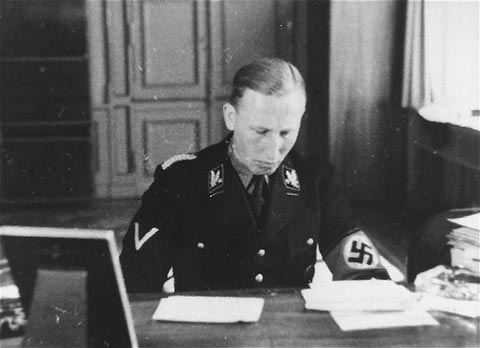
"An Einsatzgruppe D member about to shoot a Jew kneeling at a mass grave in Vinnitsa, Ukrainian SSR, Soviet Union, in 1942.
The photograph is inscribed: The last Jew in Vinnitsa.":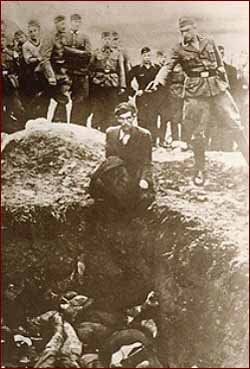
"To embargo oil to Japan would be as popular a move in all parts of the country as you could make."There might develop from the embargoing of oil to Japan such a situation as would make it, not only possible but easy, to get into this war in an effective way.
And if we should thus indirectly be brought in, we would avoid the criticism that we had gone in as an ally of communistic Russia."
In his letter to FDR, Ickes is only repeating a small part of the advice already given by Naval Intelligence Commander Arthur McCollum, back in October of 1940.
These are some of the "smoking guns" which tell us just what President Roosevelt's administration was up to.
Ok, I give up. I cant figure out the uniform the girl is wearing in the last picture. It looks similar to a German tanker uniform, but not totally and surely she’s not in the Wehrmacht. Anyone got a bead on that one?
Disclaimer: Opinions posted on Free Republic are those of the individual posters and do not necessarily represent the opinion of Free Republic or its management. All materials posted herein are protected by copyright law and the exemption for fair use of copyrighted works.